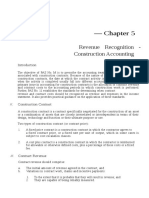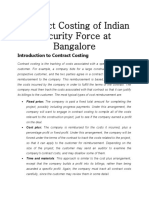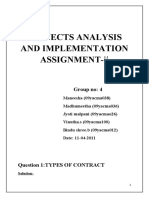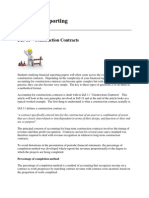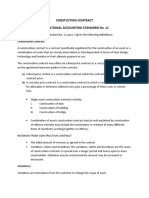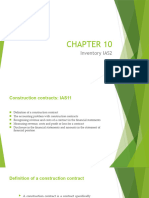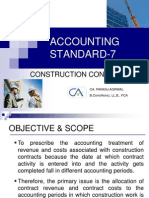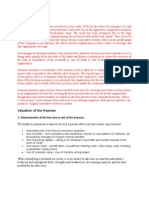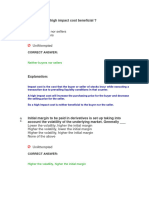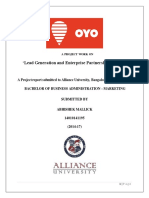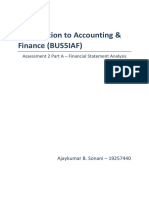Afs 7
Afs 7
Uploaded by
Freddy Savio D'souzaCopyright:
Available Formats
Afs 7
Afs 7
Uploaded by
Freddy Savio D'souzaOriginal Title
Copyright
Available Formats
Share this document
Did you find this document useful?
Is this content inappropriate?
Copyright:
Available Formats
Afs 7
Afs 7
Uploaded by
Freddy Savio D'souzaCopyright:
Available Formats
Accounting STANDARD
The primary objective of accounting standards
is to standardize the diverse accounting
policies and practices.
Accounting standards are mandatory for:
Enterprises whose equity or debt securities are listed on a recognized stock
exchange in India.
Or enterprises whose securities are in the process of being issued and will be listed
on a recognized stock exchange in India.
And for all other enterprises whose turnover for the accounting year is more than Rs
50 cr.
Objective
The objective of this Statement is to prescribe the accounting treatment of revenue and
costs associated with construction contracts. The primary issue in accounting for
construction contracts is the allocation of contract revenue and contract costs to the
accounting periods in which construction work is performed.
This Statement uses the recognition criteria established in the Framework for the
Preparation and Presentation of Financial Statements to determine when contract
revenue and contract costs should be recognised as revenue and expenses in the
statement of profit and loss
A construction contract may be negotiated for the construction of single asset such as
a bridge, building, dam, pipeline, road, ship or tunnel. Construction contract may also
deal with the construction of a number of assets which are closely interrelated or
interdependent in terms of their design, technology and function or their ultimate
purpose or use; examples of such contracts include those for the construction of
refineries and other complex pieces of plant or equipment.
For the purposes of this Statement, construction contracts include:
(a) Contracts for the rendering of services which are directly related to the
construction of the asset, for example, those for the services of project managers and
architects; and
(b) Contracts for destruction or restoration of assets, and the restoration of the
environment following the demolition of assets.
Types of Construction Contracts
Construction contracts are formulated in a variety of ways but generally fall into two
basic types:
(i) Fixed price contracts—the contractor agrees to a fixed contract price, or rate, in
some cases subject to cost escalation clauses;
(ii) Cost plus contracts—the contractor is reimbursed for allowable or otherwise
defined costs, and is also allowed a percentage of these costs or a fixed fee.
Both types of contracts are within the scope of this Statement.
7. Accounting Treatment of Construction Contract Costs and Revenues
7.1 Two methods of accounting for contracts commonly followed by contractors are
the percentage of completion method and the completed contract method.
7.2 Under the percentage of completion method, revenue is recognized as the contract
activity progresses based on the stage of completion reached. The costs incurred in
reaching the stage of completion are matched with this revenue, resulting in the
reporting of results which can be attributed to the proportion of work completed.
Although (as per the principle of 'prudence') revenue is recognized only when
realized, under this method, the revenue is recognized as the activity progresses even
though in certain circumstances it may not be realized.
7.3 Under the completed contract method, revenue is recognized only when the
contract is completed or substantially completed; that is, when only minor work is
expected other than warranty obligation. Costs and progress payments received are
accumulated during the course of the contract but revenue is not recognized until the
contract activity is substantially completed.
You might also like
- Afar 2 Module CH 7Document12 pagesAfar 2 Module CH 7KezNo ratings yet
- Module No. 2 Construction ContractsDocument18 pagesModule No. 2 Construction ContractsPrincess SagreNo ratings yet
- Basic Principles of Life InsuranceDocument44 pagesBasic Principles of Life InsuranceAlanNo ratings yet
- 3 Assignment Cost Allocation, Customer Profitability Analysis and Sales VarianceDocument4 pages3 Assignment Cost Allocation, Customer Profitability Analysis and Sales VarianceRohan TrivediNo ratings yet
- Accounting Standard-7: Construction ContractsDocument23 pagesAccounting Standard-7: Construction Contractsarun666100% (3)
- As 7Document18 pagesAs 7VEDSHREE CHAUDHARINo ratings yet
- RR Construction Accounting QuestionsDocument18 pagesRR Construction Accounting QuestionsSharmaineMirandaNo ratings yet
- Accounting StandardDocument8 pagesAccounting StandardOnkar Ashok KeljiNo ratings yet
- General de Jesus CollegeDocument12 pagesGeneral de Jesus CollegeErwin Labayog MedinaNo ratings yet
- 7 - Long-Term Construction ContractsDocument6 pages7 - Long-Term Construction ContractsDarlene Faye Cabral RosalesNo ratings yet
- IAS 11 Construction Contracts Summary With Example p4gDocument4 pagesIAS 11 Construction Contracts Summary With Example p4gvaradu1963No ratings yet
- As - 7Document18 pagesAs - 7shagunpandat303No ratings yet
- Statement of Position 81-1Document34 pagesStatement of Position 81-1Vikas RalhanNo ratings yet
- As - 7Document18 pagesAs - 7shagunpandat303No ratings yet
- Cotract Costing Project TopicDocument17 pagesCotract Costing Project TopicShravani Shrav100% (1)
- Contract Costing of Indian Security Force at BangaloreDocument17 pagesContract Costing of Indian Security Force at BangaloreShravani ShravNo ratings yet
- Contract Accounting PDFDocument29 pagesContract Accounting PDFrachel100% (1)
- MODULE 8 (Part 1)Document6 pagesMODULE 8 (Part 1)trixie maeNo ratings yet
- Week 10 Revenue Recognition-Long-term Construction Contract - ACTG341 Advanced Financial Accounting and Reporting 1Document12 pagesWeek 10 Revenue Recognition-Long-term Construction Contract - ACTG341 Advanced Financial Accounting and Reporting 1Marilou Arcillas PanisalesNo ratings yet
- Ias 11 SummaryDocument6 pagesIas 11 Summarypradyp15No ratings yet
- Ias 11 Construction ContractDocument25 pagesIas 11 Construction ContractYashu GoelNo ratings yet
- Chapter 4 Revenue Recognition 2Document52 pagesChapter 4 Revenue Recognition 2Brennan DayacapNo ratings yet
- Long Term Construction ContractsDocument3 pagesLong Term Construction ContractsJBNo ratings yet
- 6 - Pdfsam - IAS & IFRS Bare StandardDocument1 page6 - Pdfsam - IAS & IFRS Bare StandarddskrishnaNo ratings yet
- Deloitte VertDocument28 pagesDeloitte VertThoaNo ratings yet
- Recognition of Contract Revenues and Expenses: Associate Professor Victoria Firescu, Pitesti University RomaniaDocument5 pagesRecognition of Contract Revenues and Expenses: Associate Professor Victoria Firescu, Pitesti University RomaniaThéotime HabinezaNo ratings yet
- Chapter 10 - AFARDocument2 pagesChapter 10 - AFARGio BurburanNo ratings yet
- 2 Types of Construction Contract: Theory of Accounts Practical Accounting 1Document5 pages2 Types of Construction Contract: Theory of Accounts Practical Accounting 1MjhayeNo ratings yet
- A Study On Contract Costing: Project ReportDocument7 pagesA Study On Contract Costing: Project ReportAŋoop KrīşħŋặNo ratings yet
- ACCOUNTING FOR SPECIAL TRANSACTIONS - Construction ContractsDocument29 pagesACCOUNTING FOR SPECIAL TRANSACTIONS - Construction ContractsDewdrop Mae RafananNo ratings yet
- CIMA F2 Text Supplement Construction PDFDocument18 pagesCIMA F2 Text Supplement Construction PDFSiang MingNo ratings yet
- ASI FilesDocument54 pagesASI Filesafar202xNo ratings yet
- As LB 17764Document27 pagesAs LB 17764ratiNo ratings yet
- Accounting For Long Term Construction ContractsDocument34 pagesAccounting For Long Term Construction Contracts수지100% (1)
- 5 Long Term Construction Contract 3e5ca4a29cf252303 Ffcc2ab83e9ecba CompressDocument12 pages5 Long Term Construction Contract 3e5ca4a29cf252303 Ffcc2ab83e9ecba Compressgelly studiesNo ratings yet
- Projects Analysis and Implementation Assignment-Ii: Group No: 4Document13 pagesProjects Analysis and Implementation Assignment-Ii: Group No: 4Bindu_Shree_4565No ratings yet
- Construction Contracts: Learning OutcomesDocument29 pagesConstruction Contracts: Learning Outcomessadaf_gul_7100% (1)
- IFRS Construction ContractsDocument18 pagesIFRS Construction ContractsJamba WambulwaNo ratings yet
- Financial Reporting: IAS 11 - Construction ContractsDocument6 pagesFinancial Reporting: IAS 11 - Construction ContractsazmattullahNo ratings yet
- Tugas Kasus Construction Company - Fahmi Izzuddin - 1506750296Document3 pagesTugas Kasus Construction Company - Fahmi Izzuddin - 1506750296Fahmi IzzuddinNo ratings yet
- 201.13 Accounting For Construction Contracts (IAS-11)Document17 pages201.13 Accounting For Construction Contracts (IAS-11)Biplob K. SannyasiNo ratings yet
- Fa - Topic 3 Contract AccountDocument9 pagesFa - Topic 3 Contract AccountERICK ABDINo ratings yet
- Ch10 Construction ContractsDocument21 pagesCh10 Construction ContractsiKarloNo ratings yet
- IAS 11 - Construction ContractDocument13 pagesIAS 11 - Construction ContractShah KamalNo ratings yet
- 5f7b0a37479bb70c0a5abc80-1601901313-Big Picture in Focus-LTCDocument7 pages5f7b0a37479bb70c0a5abc80-1601901313-Big Picture in Focus-LTCJona Mae Cuarto AyopNo ratings yet
- AS 7 - Construction ContractDocument13 pagesAS 7 - Construction Contractsourabhgoyal3075No ratings yet
- IPSAS 11 CIMA - F2 - Text - Supplement - ConstructionDocument18 pagesIPSAS 11 CIMA - F2 - Text - Supplement - ConstructionReview Cpa TNo ratings yet
- Accounting Standard-7: Construction ContractsDocument35 pagesAccounting Standard-7: Construction Contractsvaish2u8862No ratings yet
- Accounting Standard-7: Construction ContractsDocument35 pagesAccounting Standard-7: Construction Contractsshaan0099No ratings yet
- SECL - Audit Report - FY22 - Sign - ENGDocument101 pagesSECL - Audit Report - FY22 - Sign - ENGJAMES ANDROE TANNo ratings yet
- 74708bos60485 Inter p1 cp8 U1Document33 pages74708bos60485 Inter p1 cp8 U1Gurusaran SNo ratings yet
- Construction ContractsDocument5 pagesConstruction ContractsmasahinNo ratings yet
- Construction ContractsDocument26 pagesConstruction Contractslemondaff1No ratings yet
- Accounting Standards: Group - 1Document16 pagesAccounting Standards: Group - 1Mayank JelokaNo ratings yet
- Construction Contracts An AnalysisDocument29 pagesConstruction Contracts An Analysisemmanuel JohnyNo ratings yet
- 2 Contract-CostingDocument25 pages2 Contract-CostingBhavika GuptaNo ratings yet
- CMPC 131 7-Construction ContractDocument7 pagesCMPC 131 7-Construction ContractGab IgnacioNo ratings yet
- As 7Document8 pagesAs 7abhishekkapse654No ratings yet
- Handbook of Contract Management for Construction professionals as per FIDICFrom EverandHandbook of Contract Management for Construction professionals as per FIDICRating: 5 out of 5 stars5/5 (1)
- Construction: Handbook for Project Management and Building TechnologyFrom EverandConstruction: Handbook for Project Management and Building TechnologyNo ratings yet
- Key ManDocument7 pagesKey ManFreddy Savio D'souzaNo ratings yet
- Keyman Insurance New InfoDocument10 pagesKeyman Insurance New InfoFreddy Savio D'souzaNo ratings yet
- Maximum Management Review Front PageDocument1 pageMaximum Management Review Front PageFreddy Savio D'souzaNo ratings yet
- New Issues SEBI GuidelineDocument55 pagesNew Issues SEBI Guidelineapi-3701467100% (1)
- 3G Technology and INDIADocument21 pages3G Technology and INDIAFreddy Savio D'souzaNo ratings yet
- Suitability, BenefitsDocument2 pagesSuitability, BenefitsFreddy Savio D'souzaNo ratings yet
- Reference Books: Introduction To Life Insurance Basics of Life Insurance Principles of Life InsuranceDocument10 pagesReference Books: Introduction To Life Insurance Basics of Life Insurance Principles of Life InsuranceFreddy Savio D'souzaNo ratings yet
- Asgnmnt 1 - Q PAPER1Document11 pagesAsgnmnt 1 - Q PAPER1Freddy Savio D'souzaNo ratings yet
- Life InsuranceDocument2 pagesLife InsuranceFreddy Savio D'souzaNo ratings yet
- Final KMI ChaptersDocument57 pagesFinal KMI ChaptersFreddy Savio D'souzaNo ratings yet
- BM Asgnmnt Q1Document7 pagesBM Asgnmnt Q1Freddy Savio D'souzaNo ratings yet
- Keyman Info 2Document17 pagesKeyman Info 2Freddy Savio D'souzaNo ratings yet
- Key ManDocument7 pagesKey ManFreddy Savio D'souzaNo ratings yet
- Handling The Day-To-Day Operations.: What Can The Money Be Used ForDocument13 pagesHandling The Day-To-Day Operations.: What Can The Money Be Used ForFreddy Savio D'souzaNo ratings yet
- Keyman Insurance New Info2Document3 pagesKeyman Insurance New Info2Freddy Savio D'souzaNo ratings yet
- Keyman InfoDocument15 pagesKeyman InfoFreddy Savio D'souzaNo ratings yet
- "Potential of Life Insurance Industry in Surat Market": Under The Guidance ofDocument51 pages"Potential of Life Insurance Industry in Surat Market": Under The Guidance ofFreddy Savio D'souzaNo ratings yet
- Case Study-Misrepresentation by Life InsuredDocument3 pagesCase Study-Misrepresentation by Life InsuredFreddy Savio D'souzaNo ratings yet
- 5 Tutorial Annual Worth Analysis AnswerDocument5 pages5 Tutorial Annual Worth Analysis AnswerNoor AshiqinNo ratings yet
- Miftahul Jannah (140203216) Ratna Sari (140203215)Document4 pagesMiftahul Jannah (140203216) Ratna Sari (140203215)Anonymous BgIk5z5No ratings yet
- EAS Bahasa Inggris 1Document5 pagesEAS Bahasa Inggris 1hannn041226No ratings yet
- LPP PDFDocument21 pagesLPP PDFprabu2125No ratings yet
- Testbank ProblemsDocument47 pagesTestbank Problemss.gallur.gwynethNo ratings yet
- Calculating MACRS DepreciationDocument10 pagesCalculating MACRS DepreciationM ShahidNo ratings yet
- Bba Semester I To ViDocument107 pagesBba Semester I To ViHemanrocks PaurNo ratings yet
- 11 & 12 Economics Split-UpDocument9 pages11 & 12 Economics Split-UpMadhuryaNo ratings yet
- Krisflyer Credit CardDocument25 pagesKrisflyer Credit CardFarisNo ratings yet
- Global Cheese Industry Report 2015Document7 pagesGlobal Cheese Industry Report 2015api-282708578No ratings yet
- Arithmetic 02 - Percentage 2 - Class Notes - MBA Elite 2023Document29 pagesArithmetic 02 - Percentage 2 - Class Notes - MBA Elite 2023smit prajapatiNo ratings yet
- Pass4sure All CombinedDocument379 pagesPass4sure All CombinedMohanNo ratings yet
- Lead Generation and Enterprise Partnership at OYO'Document25 pagesLead Generation and Enterprise Partnership at OYO'Raghav AgarwalNo ratings yet
- Public Expenditure Theory 5. Public Goods and Publicly Provided Private GoodsDocument25 pagesPublic Expenditure Theory 5. Public Goods and Publicly Provided Private GoodsPun Xí XớnNo ratings yet
- Sol Ch15Document5 pagesSol Ch15ElizabethBuanaNo ratings yet
- Trắc nghiệmDocument2 pagesTrắc nghiệmNguyễn Hoàng QuyênNo ratings yet
- Individual Income TaxationDocument4 pagesIndividual Income TaxationRoi RimasNo ratings yet
- Project Report: "Market Study of All Segments of Car and New Launches" ofDocument78 pagesProject Report: "Market Study of All Segments of Car and New Launches" ofRajesh Gawande100% (2)
- Introduction To Accounting & Finance (BUS5IAF) : Assessment 2 Part A - Financial Statement AnalysisDocument13 pagesIntroduction To Accounting & Finance (BUS5IAF) : Assessment 2 Part A - Financial Statement Analysisajaysonani09No ratings yet
- I Need Answer of These Following Two QuestionsDocument5 pagesI Need Answer of These Following Two Questionskalpita Kotkar0% (1)
- Example From GoogleDocument32 pagesExample From Googlemiss jiaNo ratings yet
- Applied Auditing Audit of InvestmentsDocument2 pagesApplied Auditing Audit of InvestmentsCar Mae LaNo ratings yet
- Chippy MangoDocument25 pagesChippy MangoShahriar RazinNo ratings yet
- BCAS Vista: Indonesia Morning DigestDocument12 pagesBCAS Vista: Indonesia Morning DigestVictorioNo ratings yet
- Speech 4 OutlineDocument4 pagesSpeech 4 Outlineapi-252666392No ratings yet
- Buisndss Law 1Document3 pagesBuisndss Law 1Walid HindiNo ratings yet
- World: Milking Machines - Market Report. Analysis and Forecast To 2020Document7 pagesWorld: Milking Machines - Market Report. Analysis and Forecast To 2020IndexBox MarketingNo ratings yet
- 2018 BBB Scam Tracker Risk Report InfographicDocument1 page2018 BBB Scam Tracker Risk Report InfographicKOLD News 13No ratings yet
- Contract of Sales of Goods ActDocument24 pagesContract of Sales of Goods ActchangumanguNo ratings yet






